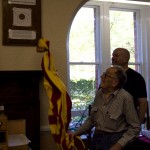Roma Marquez Santo, the POUM veteran who unveiled a plaque to the ILP’s Spanish Civil War volunteers in Salford in May 2009, died in Barcelona on Wednesday 29 December.
HARRY OWEN pays tribute to the man who fought fascism in Spain in the 1930s yet could still hold audiences charmed and spellbound with tales of his experiences more than 70 years later.

ROMA, on Wednesday morning, 29 December 2010:
I heard this morning from Imma, his carer in Barcelona, that Roma, now aged at least 94 and with advanced cancer, had suddenly taken a turn and was in hospital and not expected to last the night. Another call came after 10.30 from Alan Warren, who’d been about to leave his home to visit Roma, telling us that Roma had just passed away peacefully.
Roma was a youthful volunteer with his older brother, crawling down the Ramblas under gunfire to enlist in his brother’s party militia (the POUM) in the very first days of street fighting in Barcelona. He went on to fight in Aragon, was selected for officer training and later posted to the quieter front in Andalucia, a move which he said may have saved his life, as he missed the bloodbath of the Ebro battle.
Imprisoned after the Republic’s collapse in March 1939, he served years in prison, hearing the massacre of other prisoners in Jaen jail, something which left a lasting sense of horror in him.
He emigrated to the UK where he learnt English while working in the building trade, and went back to live in Barcelona, in recent years supporting International Brigade reunions and accepting invitations to speak in Britain and last year in Dublin, where he spoke with Liverpool International Brigade veteran Jack Edwards to the Civil War history congress, “Agonia Republicana” in Trinity college, and that night both spoke to a packed hall in the Teachers’ Club downtown.
A small, neatly dressed and quiet figure, and speaking slowly with a strong Catalan accent, he held audiences attention easily, while recounting his experiences before, during and after the war. He had small details for each of us – as when he’d tell the Irish how his mother told her children about the death on hunger strike of the Lord Mayor of Cork in 1920, during Ireland’s war of independence.
We could have brought Roma to audiences anywhere, and he would have charmed and spellbound them all. And through Roma one met the variety of his great friends, a gift in itself.
Roma made friends everywhere, and his friendships were deep, even with those of us who had known him for only a couple of years. His personal accounts of the events, and the personalities of the war, were still vivid and recalled in great clarity. With Roma, history lived on, and he was able to place his struggles into the context of today’s events, as when he reminded us in Dublin that we should bear in mind that Spain has had only 40 years experience of democracy in the last two hundred years.
A man of independent mind, and firm principles still held, which he adapted to today’s world and its struggles, he remained always a lover of his native Catalunya.
As the Gaelic saying goes – “His like will not be seen again”.
Salud, Slainte agus Beannacht a chara,
Harry Owens
—

On 30 May 2009, Roma was at the Working Class Movement Library in Salford to unveil the first ever public commemoration of ILPers who fought in Spain. Read more
Alan Warren’s obituary to Roma is on the Poumista site, here.



25 January 2011
[…] A Tribute to Roma […]